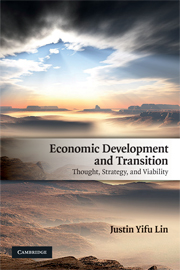Book contents
- Frontmatter
- Contents
- List of figures
- List of tables
- Preface
- 1 Development, transition and divergence
- 2 The search for a fundamental and changeable cause of prosperity
- 3 Aspirations and social thought of modernisation
- 4 Development strategy, viability and performance
- 5 Viability and strategies of transition
- 6 Development strategy, development and transition performances: empirical analysis
- 7 Why are east Asian economies so special? Are there any general lessons to be learnt from east Asian development and transition experiences?
- 8 Towards a right development and transition strategy
- Appendix 1 Development strategy and economic institutions in developing countries
- Appendix 2 Data description
- References
- Index
1 - Development, transition and divergence
Published online by Cambridge University Press: 05 June 2012
- Frontmatter
- Contents
- List of figures
- List of tables
- Preface
- 1 Development, transition and divergence
- 2 The search for a fundamental and changeable cause of prosperity
- 3 Aspirations and social thought of modernisation
- 4 Development strategy, viability and performance
- 5 Viability and strategies of transition
- 6 Development strategy, development and transition performances: empirical analysis
- 7 Why are east Asian economies so special? Are there any general lessons to be learnt from east Asian development and transition experiences?
- 8 Towards a right development and transition strategy
- Appendix 1 Development strategy and economic institutions in developing countries
- Appendix 2 Data description
- References
- Index
Summary
The consequences for human welfare involved in questions like these are simply staggering: once one starts to think about them, it is hard to think about anything else.
Robert E. Lucas, Jr (1988)When I was a student at the University of Chicago in the early 1980s I had the opportunity of observing Professor Robert Lucas prepare his 1985 Marshall Lectures. It is a great honour for me to follow Professor Lucas's steps to give the distinguished lectures twenty-two years later. I returned to China in 1987 after graduating from the University of Chicago and doing one year of postdoctoral research at Yale University's Growth Center. As the first person to return to China from abroad with a PhD degree in economics after the economic reform programme started in 1979, I have had the privilege of experiencing in person the miraculous changes in China's social and economic life and carrying out in situ research into China's development and transition over the past twenty years. Therefore, I would like to use this occasion to share with you my observations of developing countries' economic development and transition, based primarily on my experiences in China.
It is a well-known fact that, before the modern era, most countries were effectively in the development stage of a relatively backward agricultural economy – disturbed from time to time by war and natural calamities, and afflicted by the Malthusian trap.
- Type
- Chapter
- Information
- Economic Development and TransitionThought, Strategy, and Viability, pp. 1 - 7Publisher: Cambridge University PressPrint publication year: 2009



